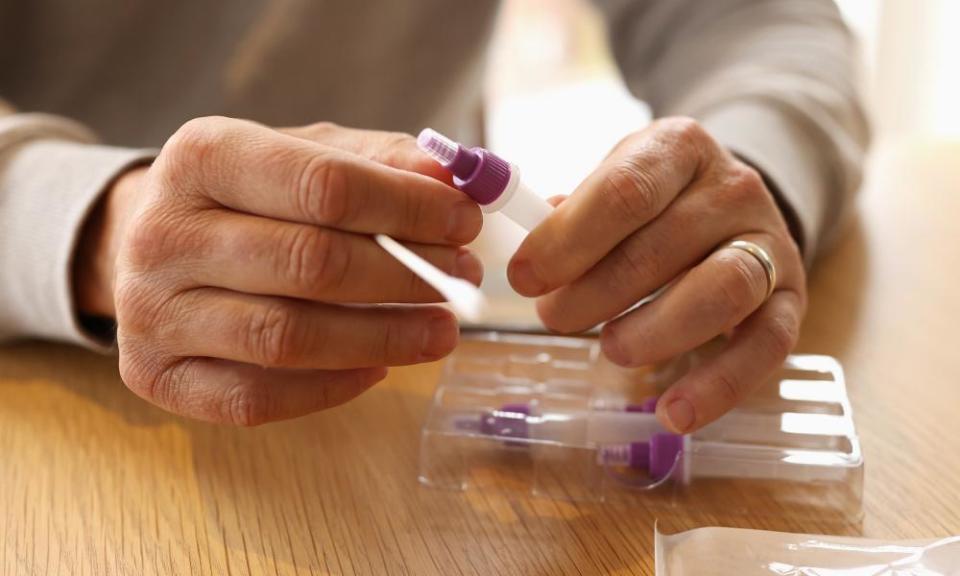Covid rapid antigen tests: how do they work, and can Australians rely on them?

From Monday, Australians can buy rapid antigen Covid-19 tests at retail stores including supermarkets and pharmacies, and also online. Previously, only health professionals were able to administer them. Australia’s drugs regulator, the Therapeutic Goods Administration (TGA), has so far approved nine different home rapid antigen tests for sale.
They cost roughly $30 for a packet of two, and between $50 and $100 for five, depending on the retailer and brand. They have a shelf life of about two years.
So who will benefit from them, and in what situations is it best to use them?
How do they work?
Currently most people are diagnosed with a PCR test, usually administered by a doctor or nurse, which involve taking a swab of the nose and throat. PCR tests are government-subsidised and are the gold standard for diagnosis – they can diagnose Covid-19 even in the early stages of the virus, sometimes even before someone feels unwell. They detect the virus almost 100% of the time when it is is administered properly.
The downside is the sample needs to be sent to a laboratory, taking between several hours to a couple of days to get a result.
Meanwhile, rapid antigen tests are most useful for detecting the virus when someone has a high viral load. Outside of this phase especially, they are not as accurate as PCR tests. There is a higher risk of false positive and false negative results.
Related: Medical entrepreneurs poised to grab slice of Australia’s Covid home-testing kit market
The benefit of rapid antigen tests is they are quick, convenient, and don’t require a laboratory. The home tests involve self-performing a nasal swab using a small cotton bud that is placed into a chemical solution. The result displays within 10 to 15 minutes.
How will the home tests fit in with the pandemic response?
Rapid antigen tests are already being used by workplaces such as fly-in fly-out mining sites, supermarkets, aged care facilities and distribution centres, especially in states and suburbs with high Covid-19 case numbers.
In these workplaces, the tests are provided free by the employer. They are usually administered daily, or each time someone has a shift. This regular testing increases the probability of detecting the virus. They are performed or supervised by a registered health practitioner, increasing the chance of an accurate result.
“This is where the rapid antigen tests have real utility, and I advocate their use in these settings and workplaces absolutely, mainly when there is a lot of Covid around in the community,” Dr Emma Miller, a public health epidemiologist with Flinders University, said.
“But for the average punter at home, they will be less useful really than they might appear, and it’s difficult to see why you might use one. First of all, they’re quite expensive. And as an epidemiologist with an elderly mother in hospital with stroke, I won’t be purchasing them, because PCR tests are still the most accurate and best for peace of mind.”
They could do more harm than good, she said, if people were to return a false negative, then visit a vulnerable person or go to a party.
How are states and territories using home tests?
A spokesman for the NSW Department of Health said how home testing can be most effectively incorporated into the pandemic response is still “part of ongoing planning”.
Related: Covid-19 vaccine booster shots: where and when you can get your third dose in Australia
“NSW Health is currently working with the Department of Education on the role rapid antigen testing can play in supporting children who may have been exposed to Covid-19 to safely return to school following a short period of isolation,” he said.
A Queensland Department of Health spokesman, when asked in what situations home tests would be recommended, responded that PCR tests will “continue to be the preferred method of testing”.
“Rapid antigen tests for specific cohorts and specific testing situations may be considered,” he said, but did not specify any further.
The Victoria and Western Australia departments of health did not respond to questions about how the home tests should best be used.
In a press release, Roche, a manufacturer of one of the approved rapid antigen tests for sale, said self-testing could be useful before attending parties, before travelling to regional parts of Australia, for families with young children at school who have not yet been vaccinated, and in offices and other work settings as part of return-to-work plans.
What should I do if I test positive from an at-home test?
While there will be no requirement to formally report the result of a rapid antigen screening test to the health department, a NSW Health spokesman said people who test positive from a home test should arrange a PCR test “as soon as possible”.
NSW Health and other state and territory health departments do collect and report positive PCR test results, and can then begin contact tracing.
The World Health Organization recommends that if you have Covid-19 symptoms but test negative from a home test, you should follow up with a PCR test to be sure.
Are there restrictions around how rapid antigen tests can be advertised?
Yes.
The TGA says home rapid antigen tests are a useful initial screening tool, while the traditional PCR test is a diagnostic tool. Manufacturers and sellers cannot advertise home rapid antigen tests as a “diagnostic” test.
They also can’t claim one test is better or more accurate than other approved tests on the market.

 Yahoo Finance
Yahoo Finance 